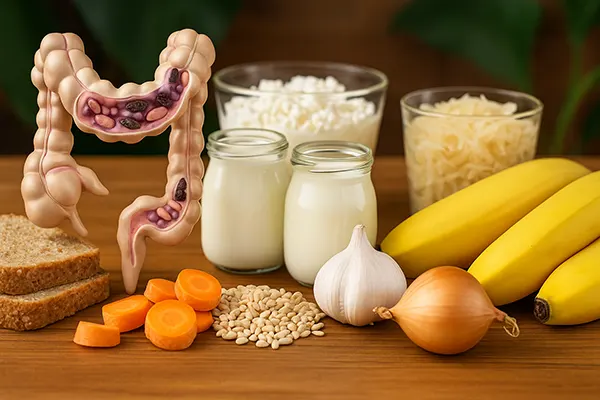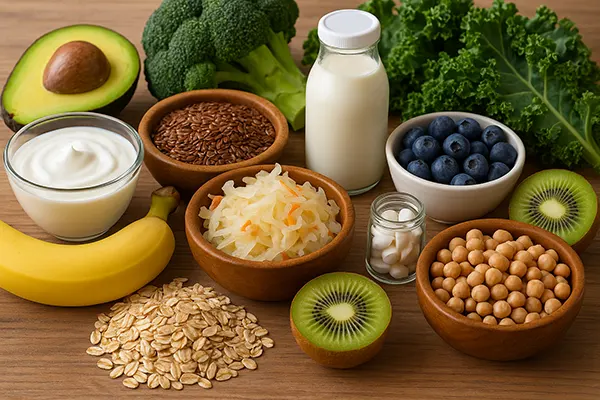
Gut Microbiome: How Probiotics and Prebiotics Affect Immunity and Mental Health
The gut microbiome is increasingly recognised as a key player in maintaining overall health. It influences not only digestion but also immunity and mental well-being. Modern research highlights the importance of probiotics and prebiotics in sustaining microbial balance, which in turn supports both physical and psychological resilience.
The Gut Microbiome and Immunity
The gut contains trillions of microorganisms, including bacteria, viruses and fungi. Together, they form a complex ecosystem that trains the immune system to differentiate between harmful pathogens and harmless substances. A diverse microbiome strengthens the body’s ability to resist infections and inflammation.
Probiotics, commonly found in fermented foods and supplements, help restore microbial balance when it is disrupted by antibiotics, stress or poor diet. They promote the growth of beneficial bacteria, which can suppress harmful strains. This reduces the risk of chronic conditions linked to inflammation, such as allergies and autoimmune diseases.
Prebiotics, which are dietary fibres from foods like onions, garlic, bananas and whole grains, nourish beneficial bacteria. By feeding these microbes, prebiotics indirectly enhance immune responses. Scientific studies in 2025 confirm that diets rich in prebiotics lead to improved production of short-chain fatty acids, which support the immune system and reduce systemic inflammation.
Probiotics and Infection Resistance
Clinical trials show that probiotic supplementation lowers the incidence of respiratory and gastrointestinal infections. Specific strains such as Lactobacillus rhamnosus and Bifidobacterium bifidum are particularly effective in boosting natural defences. They help reinforce the intestinal barrier, preventing pathogens from entering the bloodstream.
Recent findings also reveal that probiotics regulate cytokine production, reducing excessive immune reactions. This is particularly valuable for individuals prone to inflammatory disorders. By balancing immune responses, probiotics contribute to long-term resilience against infections.
In children and the elderly, who often have weaker immune systems, probiotics play a preventive role. Evidence from global health studies indicates fewer hospital visits and faster recovery rates among those regularly consuming probiotic-rich diets.
The Gut-Brain Connection
The gut microbiome communicates with the brain through the gut-brain axis, a network of neural, hormonal and immune pathways. This connection explains why digestive health often correlates with mood and mental performance. An imbalance in gut bacteria has been linked to anxiety, depression and cognitive decline.
Probiotics, sometimes referred to as “psychobiotics” when used for mental health, can influence neurotransmitter production. For example, certain Lactobacillus species promote the release of serotonin, a chemical that regulates mood. Prebiotics, by supporting healthy gut flora, also contribute to better stress resilience.
In 2025, clinical research confirms that individuals who consume a diet enriched with probiotics and prebiotics show improved sleep quality, reduced anxiety levels and enhanced cognitive performance. This positions gut health as a cornerstone of psychological well-being.
Impact on Stress and Anxiety
Stress alters the composition of the gut microbiome, leading to reduced microbial diversity. This change weakens the body’s stress response and exacerbates anxiety. Probiotic intake has been shown to counteract these effects, restoring balance and improving emotional stability.
Controlled trials demonstrate that daily probiotic supplementation reduces cortisol levels, the primary stress hormone. Lower cortisol contributes to better emotional regulation and reduced risk of stress-related illnesses. Prebiotics enhance this effect by supporting beneficial microbes that influence brain chemistry.
For individuals experiencing chronic stress, the combination of probiotics and prebiotics offers a natural, non-invasive way to manage symptoms. Mental health professionals increasingly recommend dietary interventions alongside traditional therapies.

Practical Ways to Support Gut Health
Maintaining a healthy microbiome requires a consistent lifestyle approach. This includes consuming a variety of fibre-rich foods, staying hydrated, and reducing processed sugar intake. Fermented products such as yoghurt, kefir, sauerkraut and kimchi provide live cultures that replenish beneficial bacteria.
For those unable to obtain sufficient probiotics through diet, supplements are a reliable option. However, selecting clinically tested strains is essential for achieving measurable benefits. Prebiotic supplements can also be used to complement a balanced diet, particularly in individuals with restricted food choices.
Beyond nutrition, factors such as stress management, physical activity and adequate sleep significantly affect gut health. Research consistently shows that lifestyle choices either support or hinder microbial diversity. Therefore, a holistic approach is necessary to fully benefit from the synergy of probiotics and prebiotics.
Future Directions in Gut Health Research
By 2025, personalised nutrition based on microbiome analysis is gaining popularity. Using genetic sequencing, healthcare providers can recommend targeted probiotic and prebiotic combinations tailored to individual needs. This precision approach enhances treatment outcomes and prevents chronic conditions.
Pharmaceutical companies are also exploring microbiome-based therapies for autoimmune diseases, mental health disorders and metabolic conditions. Early results are promising, suggesting that microbiome science will play a central role in future healthcare strategies.
Public awareness campaigns highlight the importance of gut health in daily life. Governments and health organisations now recommend incorporating probiotic and prebiotic foods into dietary guidelines, recognising their broad impact on population health.
